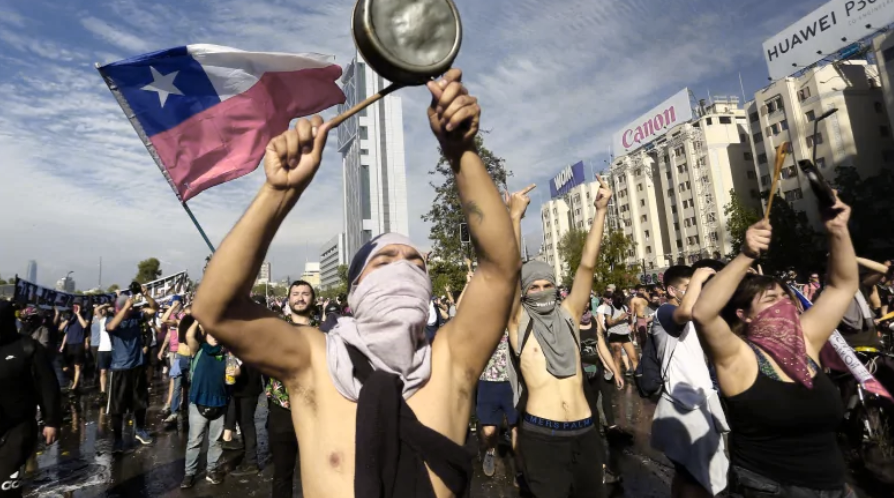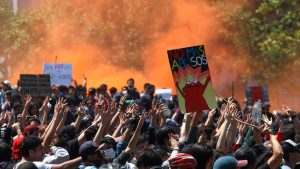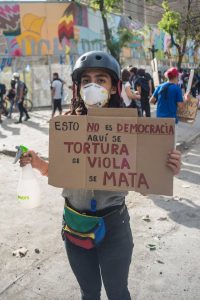.
.
.

At the massive demonstrations taking place in Chile, people have adopted a rock song composed during the last years of Pinochet’s 1973-90 dictatorship as their symbol of rebellion.
Back then, a group of students frustrated with the predominantly private educational system, leaving them with a bleak future, formed a musical group to express their views. Their message questioned the drastic inequality resulting from the economy, which was leaving many behind. The benefits of the economic growth of the country was not improving most Chileans’ basic individual needs such as health, education, pensions.
30 years later, the discontent has deepened and extended to the political system sustaining the economic model.
A background to the current crisis is presented here:
“A modest subway fare increase that started on Oct. 6 led high school students to jump turnstiles at metro stations in Santiago, the capital, earlier this month. They promoted it as an act of civil disobedience using the hashtag #EvasionMasiva, or “Mass Evasion,” on social media.
 As fare dodging became rampant, some metro stations closed and police cracked down violently on passengers who had jumped over turnstiles.
As fare dodging became rampant, some metro stations closed and police cracked down violently on passengers who had jumped over turnstiles.
That was the catalyst for large street protests that soon became about much more than the cost of riding the subway.
Many poor and middle class Chileans said they were fed up with the rising cost of utilities, stagnant wages and paltry pensions in a nation that has long heralded itself as well-run and prosperous.
…Yet, inequality remains deeply entrenched in Chile. And many Chileans feel left behind as they take on debt to get through the month and struggle to plan for retirement.
… Recent corruption cases involving powerful businessmen and Chile’s federal police force have been a major source of outrage. And many Chileans reacted with indignation when Mr. Piñera was issued a fine in August for dodging property taxes on an estate he has owned for years.”
The article also mentions that: “Over the weekend, a wave of protests in Chile set off by an increase in subway fares deteriorated into widespread looting, vandalism and arson. President Sebastián Piñera declared a state of emergency, imposed curfews and ordered the armed forces to restore order — measures that were jarring for Chileans who lived through a repressive period of military rule in the 1970s and 1980s.”
The presence of the Army in the streets was short-lived, as the Commander did not agree that Chile was in a state of war as Piñera had initially characterized the protests. Then the Police Special Forces took over the role of brutally repressing some of the demonstrations. Besides lethal force, they used rubber pellets to inflict serious body damages, targeting the eyes of demonstrators. At least 220 persons suffered severe damage, according to a report by Amnesty International.
One of the key elements of this crisis, the constitution enacted under Pinochet, which is the political framework maintaining the economic model in question,is going to be replaced. Most of the political parties, including those in the coalition government, agreed to call for a referendum to draft and ratify a new constitution.
 This newspaper report describes this important step: “Much of the protesters’ anger has focused on Chile’s 1980 constitution, which is seen as the embodiment of Augusto Pinochet’s neoliberal model, prioritizing a market-driven economy but failing to adequately guarantee healthcare, education and pensions.”
This newspaper report describes this important step: “Much of the protesters’ anger has focused on Chile’s 1980 constitution, which is seen as the embodiment of Augusto Pinochet’s neoliberal model, prioritizing a market-driven economy but failing to adequately guarantee healthcare, education and pensions.”
The youth born after the dictatorship was not afraid of spearheading the rebellion, confronting the repressive apparatus of the state.
The rock band that captured the frustrations and hope of many Chileans was called Los Prisioneros. They were continuously harassed by the government during the Pinochet era, but a few years later they performed in a well-known musical festival:
It’s another night of walking,
it’s another end of the month, with nothing new,
My friends ended up, just like you,
this year the games ended,
those 12 games.
(Chorus)
Join up to the dance, of those left behind,
no one will ever kick us out of here,
because no one ever really wanted to help us out at all.
They told us when we were kids,
play the studying game,
all of us men are brothers,
and together we should all strive.
We heard the council, the gleaming eyes of our professor,
The sun shone so bring, over our heads,
and it was all false,
because at the end of those games,
some ended up with laurels and futures,
and me and my friends ended up just kicking rocks.
(Chorus)
Join up to the dance, of those left behind,
no one will ever kick us out of here,
because no one ever really wanted to help us out at all.
Hey! I remember those stories about the future!
Hey! That time when I learned about them I felt the safest!
Under our shoes, there’s clay under concrete,
The future is nothing
like what was promised during those twelve games.
Others learned secrets we weren’t told.
Others were truly given that thing we call education.
We were asked for effort, we were asked for dedication
And for what?! So that we could end up dancing and kicking stones!







Shooting pellets into people’s eyes. Holy crap.
I’m glad that at least the army got out of the way. That was not a given,
I hope that those security forces pay an appropriate price for their crimes.
*Folks, may have notice…just in passing that there are about 50 countries with people rioting in the streets. Everywhere from Hong Kong to Lebanon. Africa, throughout the Middle East, Europe, Asia, South America……kind of make you wonder why the price of gasoline is going through the roof in every country, when everyone is switching to EV, AV,AI Vehicles, both Commercial and Private. The world INFLATION folks is out of control. The price of rents and food and water and living is driving the Homeless world we are all now engaged in. When you think that we liive in the so-called “Most Wonderful Country on Earth”….and LA has nearly 60 thousand people that are living on the streets or in San Fran/Oakland there are over 130 Thousand Homeless….well we really should start to pay attention. New York has well over 200 thousand Homeless too.
Tonight the news came on to say that if you lived in LA…..only people with a income of $204 Thousand a year or more…..we living happily! Argentina, Chile, Peru, Brazil, Venezuela, Columbia, Panama, the Guyanas, Ecuador, Paraguay, Uruguay…..well….some stuff, different day.
An update by writer Ariel Dorfman : “The essential question that confronts Chile is one that many other nations are grappling with today: Can the demands of a radicalized and disaffected movement of citizens, most of whom are young, impatient and social media-savvy, be channeled and resolved by a political elite that has shown itself, until now, blind to the needs of the great majority of its populace?”
https://www.nytimes.com/2020/01/24/opinion/chile-protests.html